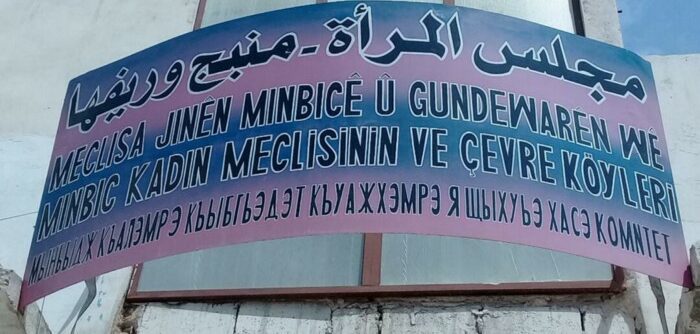While the applicability of the Kurdish movement’s feminist principles to non-Kurdish communities in Syria has been debated by analysts and observers, few serious attempts to understand how women from these communities view these principles in practice have been made.
The case of Manbij, liberated from ISIS by the SDF in August 2016, shows how women in a multi-ethnic Syrian city used AANES [the Autonomous Administration of North and East Syria] frameworks to build institutions, take on leadership roles, and organize in their communities to change discriminatory attitudes.
The success of women’s political and military structures in Manbij over time suggests that the AANES system can be a true model for women’s empowerment across Syria.
Military Institutions
By 2016, women in North and East Syria had been fighting on the front lines for several years. Images of civilians embracing YPJ fighters were shared in international media coverage of the liberation of Manbij, becoming symbolic of the broader fight against ISIS.

By the end of the operation, local women had already begun to join the Manbij Military Council (MMC), which was set up in April 2016 before the SDF effort to take the city. One female commander, Xaliya Nîmet, said that more than 150 women had joined the MMC by early August of that year.
In February 2017, the Martyr Roxan Academy was established as the first women’s military academy in the region. 30 fighters, mostly young Arab women, completed its first two-month training course. Many of the women who joined were motivated to do so because of the injustices they suffered under ISIS—and the example set by the Kurdish women of the YPJ.
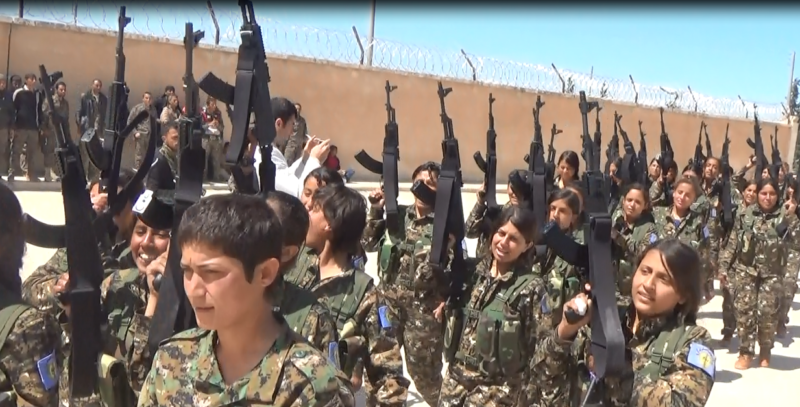
In September, 42 women completed a course at the academy named for Amara Jarablus, an SDF fighter from Manbij who lost her life in Raqqa. In December, 48 more women completed a course named after Sakine Eseliye, another female SDF martyr from Manbij. In total, more than 100 women joined the SDF through this academy in its first year of existence.
The Manbij Military Council has published the stories of several female fighters who joined SDF structures in Manbij after the city’s liberation. All of them faced brutal oppression under ISIS rule, and many came from conservative families that restricted their rights even before the group came to power.
One fighter named Parvin was forced to leave school when extremist groups took control of the region. ISIS murdered her father, disappeared her uncle, and kidnapped her brother for ransom. Another fighter, Sabah Ibrahim, was arrested and tortured by ISIS before Manbij was liberated. Another, named Heba, was displaced to Manbij from Tadif. Her first husband was killed fighting ISIS as a member of the SDF, and she joined herself months after her family forced her to remarry.
Political Institutions and Civil Society
While women’s participation in the YPJ and SDF has attracted international attention, the role of women in civilian institutions in the AANES is no less important. These institutions have been largely responsible for the day-to-day efforts to change discriminatory social attitudes and empower Syrian women in their communities.
Manbij was one of the first places where AANES political structures and social policies were implemented in an area without a Kurdish demographic majority. Yekitiya Star, the confederation of women’s organizations in North and East Syria, was active in Manbij as early as 2013, establishing a Women’s Knowledge and Education Center there in March of that year.
Since its liberation from ISIS, women from all of the different ethnic and religious groups in the region have participated actively in women’s political institutions and civil society organizations.
Women in the Democratic Civil Administration
In 2017, when the Manbij Democratic Civil Administration was formally created, it was established with a co-chair system and the 40% quota for women’s representation that is mandatory across North and East Syria.
Its leaders noted the initial difficulty of finding non-Kurdish women who were willing to participate:
“The greatest challenge was to win enough women among the non-Kurds for this function in accordance with the gender quota of 40% as agreed. This was due to the fact that among them, so far very few women had been active in the public-political sphere and the question of women’s rights had hardly been posed in a serious manner. For several weeks we struggled for a sufficient number of women to be represented in the legislative. Only because 50% of the Kurds in the legislative of the Manbij Democratic Administration were women, was it possible to observe the quota.”
Some early female leaders in the civil administration included Zeyneb Qenber, co-chair of the Executive Council of the Manbij Democratic Civil Administration; Jamila Ahmed, deputy co-chair of the Administration; Nufa Suleiman, co-chair of the Defense Committee; and Hanan Mohammed, co-chair of the Economy Committee.
Qenber was considered prominent enough to meet directly with Coalition officials and U.S. diplomats in her capacity as Co-Chair, suggesting that she held real authority.

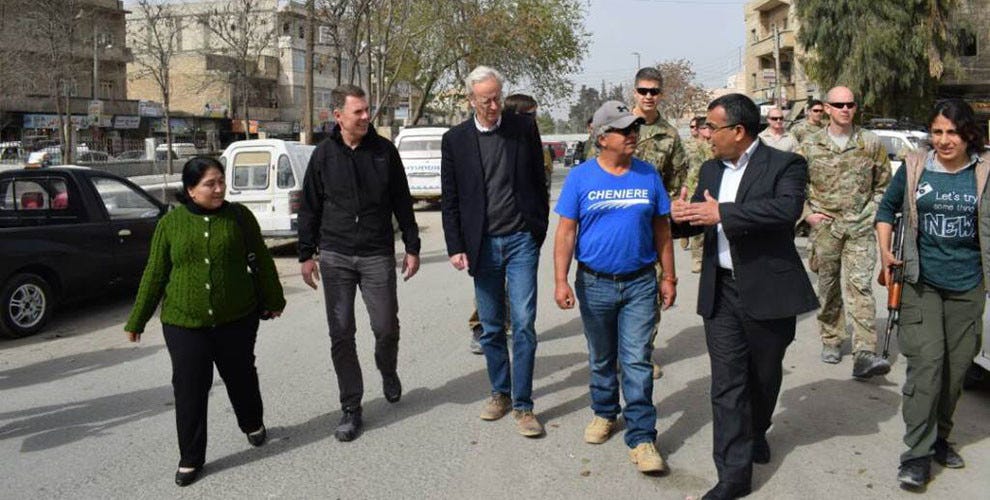
Today, Nazifa Khalo serves as co-chair of the Executive Council of the Administration. She previously served on the Legislative Council. Noura al-Hamid serves as deputy co-chair of the Executive Council. Zozan Hussein is Co-Chair of the Legislative Council.
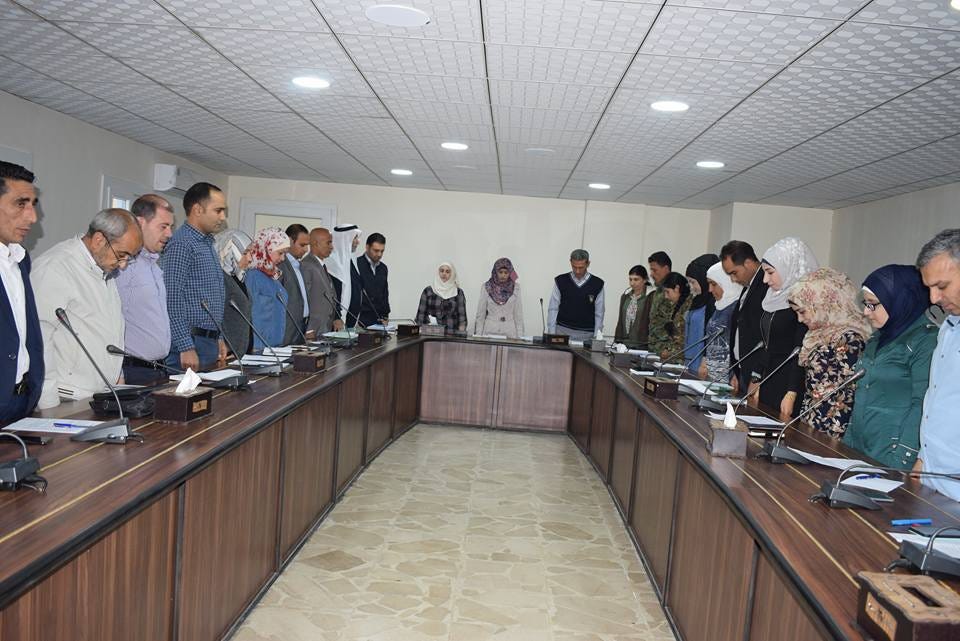
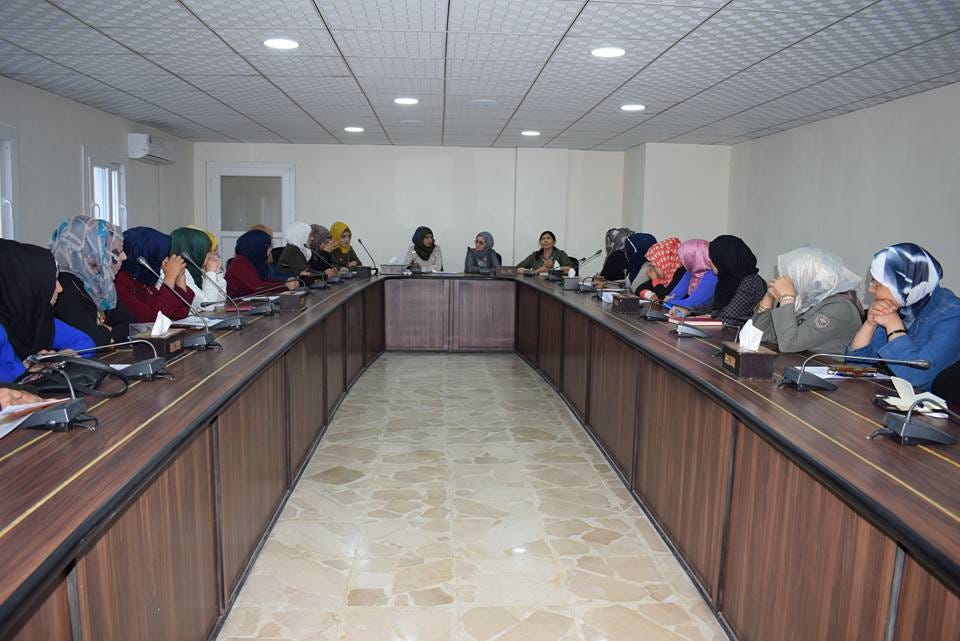
Women’s Houses

The first women’s institution established in liberated Manbij was a Mala Jin, or women’s house, which was opened in the city in November 2016.
Women’s houses are unique institutions in North and East Syria that protect victims of gender-based violence, resolve domestic disputes, and intervene to prevent women from being exploited and oppressed.
Within a month of the first women’s house being opened in Manbij, local media reported that it had accepted 25 cases, of which seven had been resolved and 18 were still under investigation. 15 Arab and Kurdish women had been working in the house during that time period, and efforts were underway to involve Turkmen and Circassian women.
In May 2017, another women’s house was opened in Abu Qalqal, in the countryside south of the city. Six women in total worked there, including the administrator of the house.
Iman Hamsho, who works with the women’s houses in the region, stated that this house had received the most serious cases and the highest volume of cases as of 2019.
In September 2017, a third house was established in Al Hayya, east of Manbij. It had one administrator, Amani al-Nana, and three other members when it was opened.

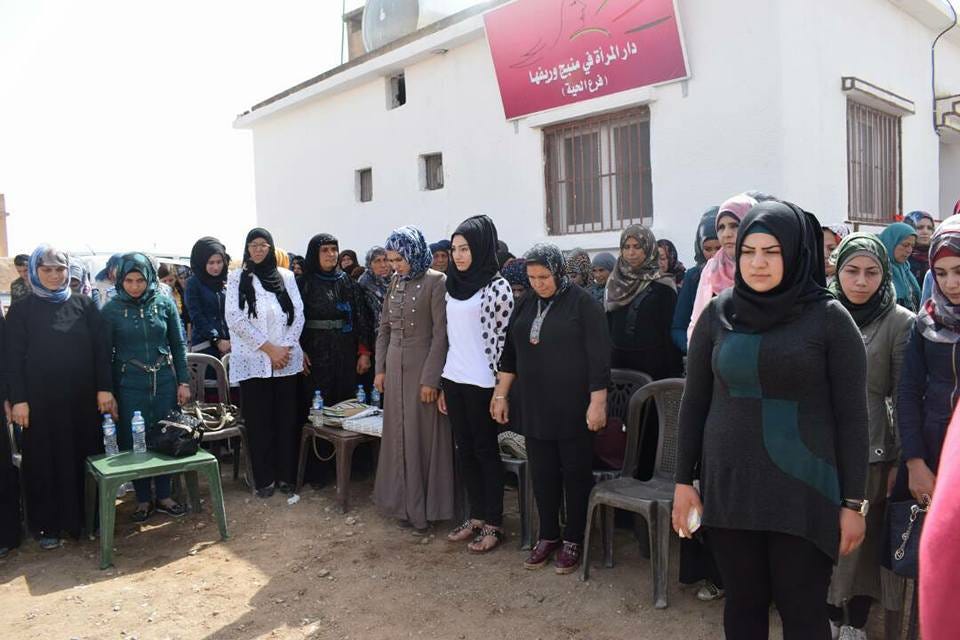
In August 2018, a fourth was opened in Al Farat neighborhood.
In total, by 2019, women’s houses in Manbij had taken on over 3,000 cases. Less than 10% of these cases had been referred to the formal legal system, while the majority had either been resolved by the houses or referred to the social justice and reconciliation committees for resolution.
One notable aspect of the work of women’s houses in Manbij was their role in helping women who had suffered from gender-based violence and other oppression under ISIS. Some of the early work carried out by the region’s first women’s house included the formation of a Research Committee, which documented the testimonies of women who were harmed by the terror group.
Women’s Assemblies
Under the Autonomous Administration of North and East Syria, women’s assemblies are supposed to exist in parallel to mixed-gender institutions at every level of governance. This policy reinforces women’s influence in government, in addition to the quotas and co-chairs systems that ensure their representation in mixed institutions.
The Women’s Assembly in Manbij was established in March 2017. Women from the city’s mixed-gender governing bodies participated in the meeting, as well as representatives of the Revolutionary Arab Youth Movement and the Syrian Democratic Council also attended. Ultimately, 35 women were elected to the Assembly.
The Assembly has coordinated with local women to create smaller women’s assemblies and communes in villages and towns across the region. By May 2019, they had helped establish 43 of these assemblies.
Today, the Women’s Assembly collaborates with other institutions to supervise a variety of projects. Recent efforts of theirs have included a demonstration condemning increasing domestic violence rates under COVID-19 lockdowns and literacy courses for adult women who had not been able to complete their formal education.


Women’s Economic Empowerment
In June 2017, women from Manbij participated in the first Women’s Economy Conference in North and East Syria, which was held in Derik.
The first women’s co-operative in Manbij, the Beit Al Baraka Association, was established in September 2017, with the support of the People’s Municipality of Manbij and the Economic Committee.
This co-operative employed 10 women to grow and prepare vegetables and other food products.
In November 2017, a Women’s Economy Center was opened in the city. The center had three members when it was founded, according to its administrator, Sabah Mohammed.

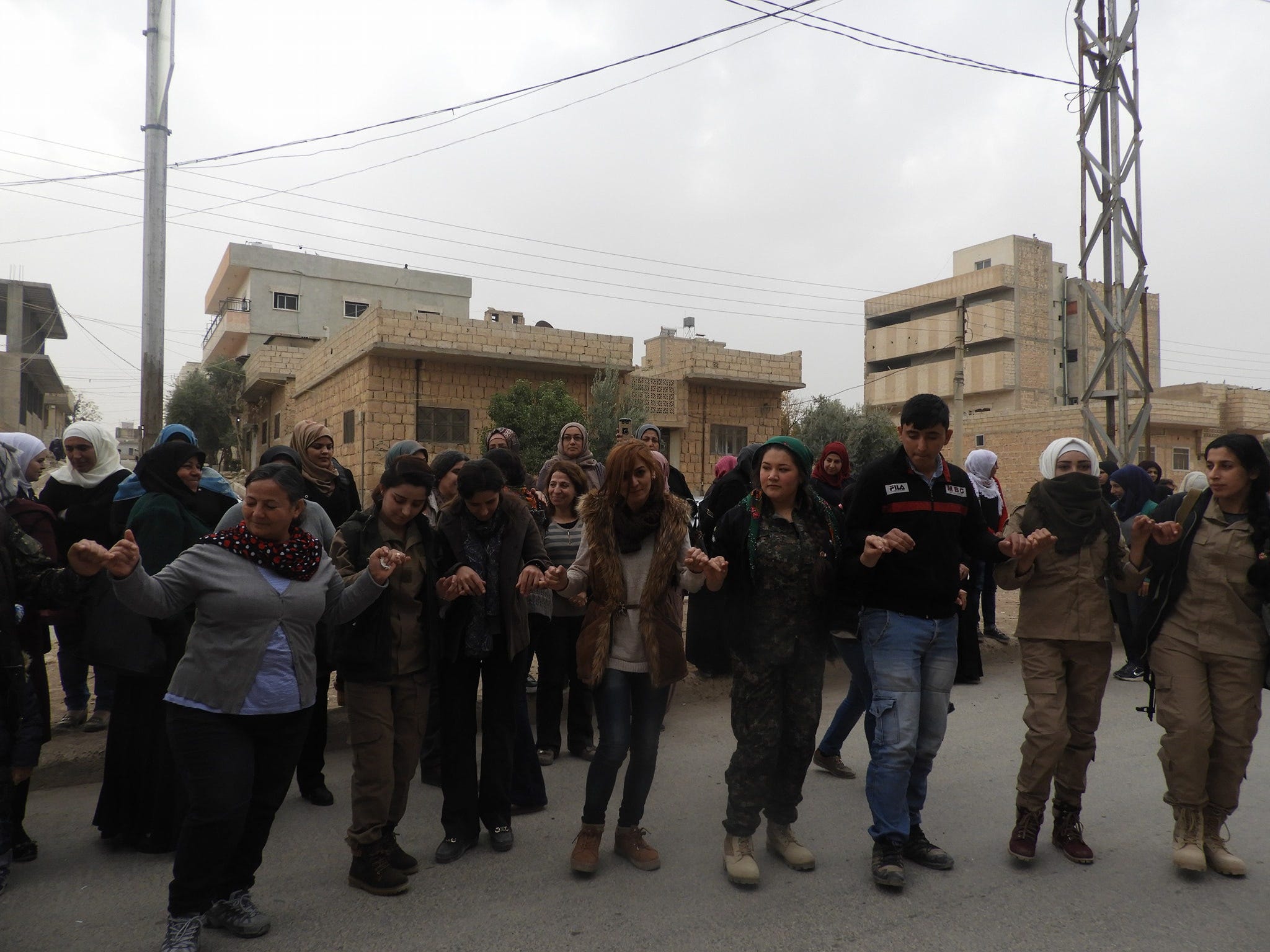
Today, multiple women’s co-operatives exist in Manbij, providing women with quality employment and working to meet local economic needs. In March 2018, a co-operatively run restaurant was opened. A co-operatively run chicken farm co-operative has also been established.
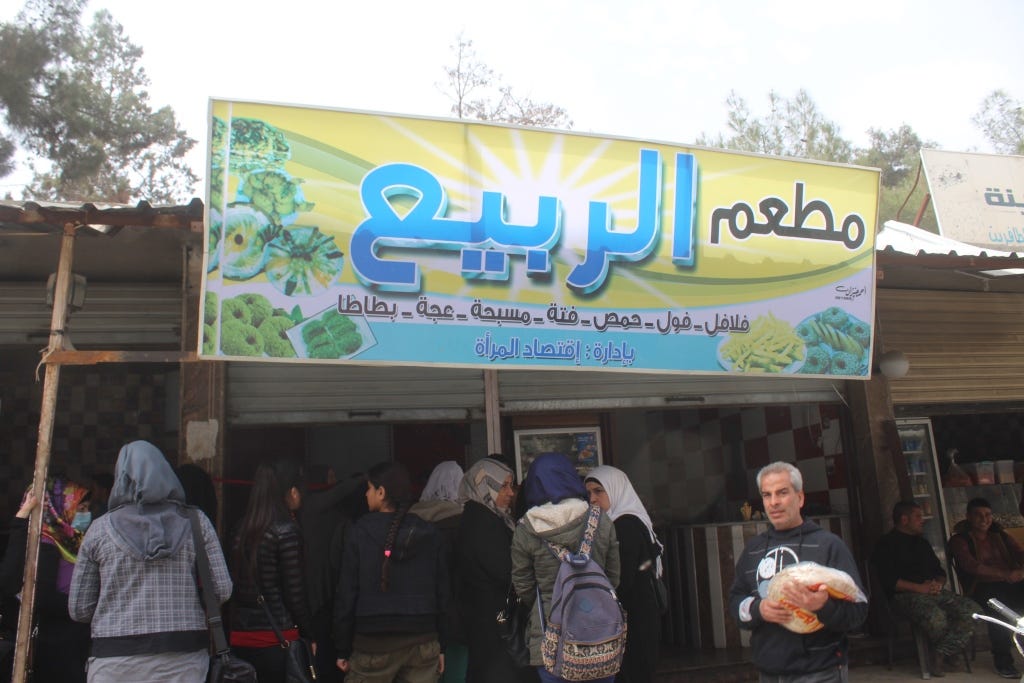
In a timely example of the role that women’s co-operatives can play in meeting the needs of the communities where they operate, the Martyr Sakine Eseliye Workshop—a textile co-operative that employed almost 28 women when it was founded in 2018—is now producing face masks to help Manbij prepare for the COVID-19 pandemic.
Different women’s institutions work to empower women working in different fields. In one example, ANHA reported in 2017 that women on the Executive Council of the Democratic Civil Administration had met with female staff at Al Furat Hospital, helping them organize a committee for managing women’s concerns in their workplace.
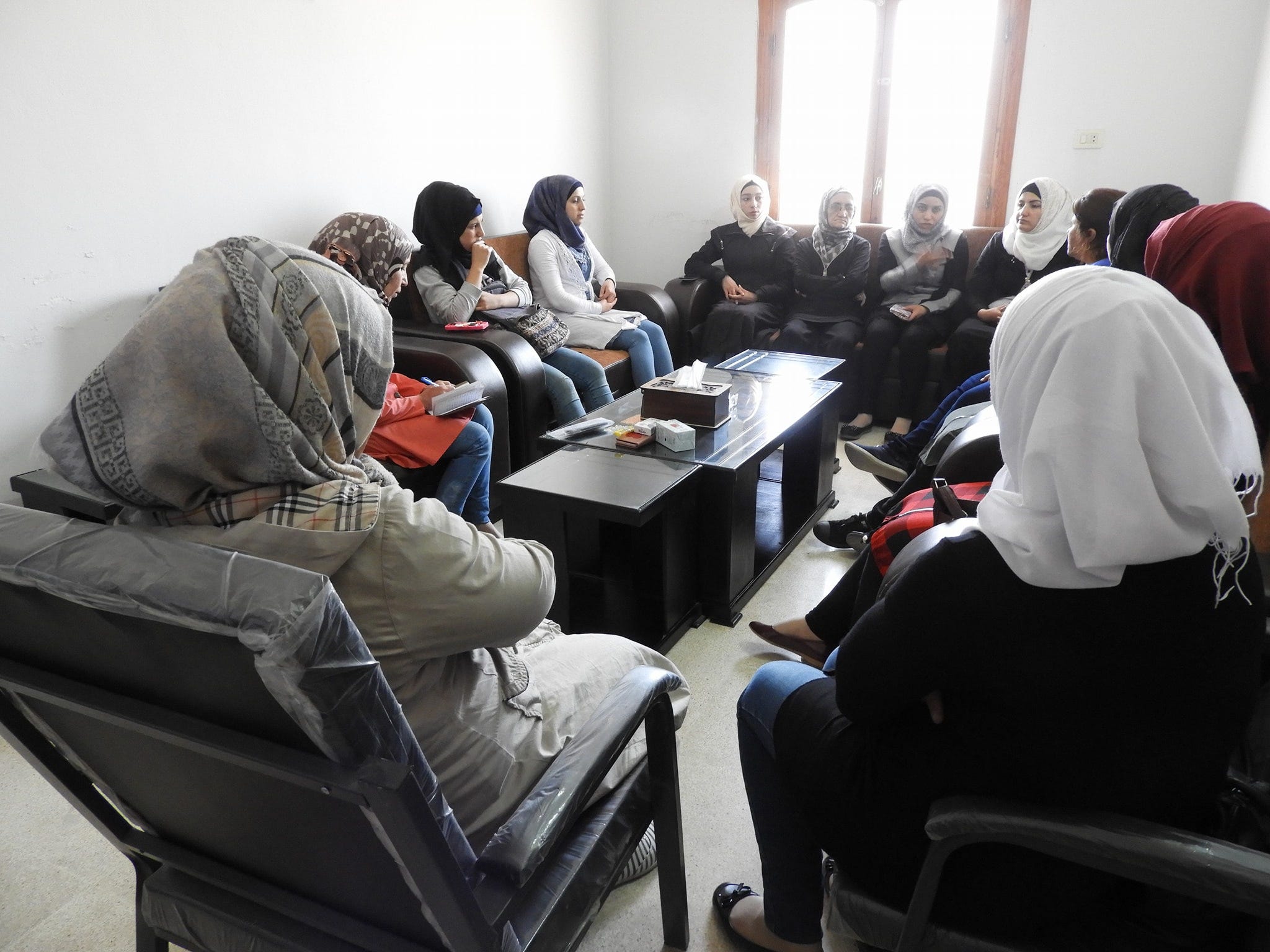
The Women’s Laws in Manbij
Due to conservative attitudes among some segments of the population, the AANES Women’s Laws, adopted in Kobane, Jazira, and Afrin Cantons in 2014, are not applied in full there.
However, women’s institutions do campaign to enforce many of the protections that these laws provide elsewhere. One local report from January 2017 describes a typical case addressed by a local women’s house—a family attempting to force their daughter to get married against her will. The house was able to convince the family to stop the marriage by explaining how it would harm all parties involved. The case did not have to be brought to the formal legal system to be resolved in a way that protected a vulnerable woman’s rights.
Members of women’s organizations in Manbij also meet directly with women in their homes and villages in order to make them aware of their rights and educate them about social problems. In October 2018, the Manbij Women’s Assembly claimed to have met with more than 3,000 women to discuss these issues.
There is evidence that some women in Manbij oppose the lack of formal legal protections that their counterparts in other regions enjoy. In January 2020, the Young Women’s Union in the city demanded laws to protect young women and further efforts to oppose underage marriages.

Jineoloji in Manbij
A jineoloji research center was opened in Manbij on January 2nd, 2018. The opening ceremony was attended by both male and female commanders in the Manbij Military Council, as well as local activists and political figures.

Jineoloji, the Kurdish women’s movement’s “science of women,” is controversial among some conservative populations in North and East Syria. In Deir Ezzor, Arab leaders protested the inclusion of the subject in school textbooks, leading to its removal.
In Manbij, however, the research center has remained open and active for over two years. In July 2019, it held its first training course for young women. In June 2020, it held meetings for both men and women on the importance of respecting women’s rights within families.
Women from Manbij in the AANES
A 2019 survey of the Executive Council of the Autonomous Administration of North and East Syria conducted by the Rojava Information Center revealed that three members of the 54-person council were women from Manbij.
Alaa Ahmed, an Arab woman, served as Co-Chair of the Health and Environment Commission.
Another Arab woman, Maha Ali, was a deputy leader of the Women’s Commission. Ali had previously been a spokesperson for the Women’s Assembly in Manbij. The selection of an Arab woman from a mixed city to serve in a region-wide political role related to women’s rights shows that the AANES does not want to confine its revolutionary social policies to Kurdish communities.
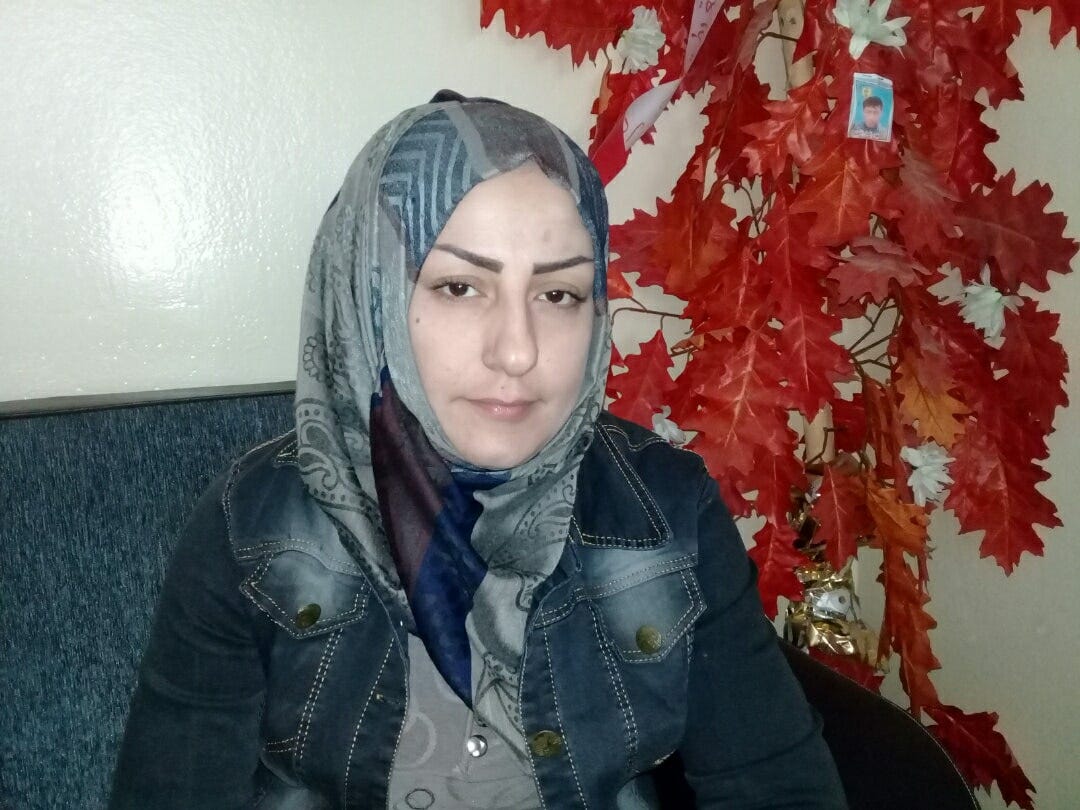
The most prominent woman from Manbij on the AANES Executive Council was Amal Dada, a member of the region’s Turkmen community. Representing the Syria Future Party, Dada had previously served in the Legislative Assembly in Manbij, and had worked as a teacher prior to the Syrian war. She is now the Co-Chair of the AANES External Relations Commission.

In a 2017 interview with ANF, she described how women’s lives changed after the city’s liberation from ISIS:
Women lived a life of imprisonment inside the house after ISIS came. We could not ever leave the house. Pressures on women increased and we were tortured with the smallest of excuses. They interfered in what we would wear and when we could go out to the street. There was no such thing as private life. First they interfered in schools and later closed them all. Now, women have taken a great initiative and are progressing towards where they should be. It was women to experience the greatest freedom after Manbij was liberated from ISIS. Women now take part in efforts to make the city more beautiful and fraternal. Women from all peoples living in Manbij participate in this reconstruction equally and with their own will.
In 2018, also speaking to ANF, she described the diversity of the region’s government under the Autonomous Administration:
“We have a co-presidency system, we have established our democratic administration under this system, and women are 50 percent of the administration members (in total we are 132). All the peoples in Manbij are represented in a proportionally way…the Administration is made up of 71 representatives for the Arab people, 41 for the Kurdish people, 10 for the Turkmen, 8 for the Circassian and 1 for the Armenian.”
Dada was also actively involved in the promotion of Turkmen cultural identity in Manbij. She suggested in 2018 that a Turkmen cultural association there would be important not only because it would help her community connect with its traditions, but because it would allow Arabs and Kurds to learn about their culture as well, bringing the peoples of Manbij together.
Her role in the AANES Executive Council also suggests that advances in women’s rights in North and East Syria are intended for all communities— even those that opponents of the AANES often seek to co-opt.
Implications
This brief overview of what the revolutionary social policies of the AANES have done over time in a multi-ethnic city that suffered greatly under ISIS rule shows that there was no “foreign” or “imposed” ideology. Rather, women used the opportunities that were presented to them to gain more rights, take on leadership roles, and become active in their communities. What the AANES and SDF did was set an example and open political and social space for women to choose to organize.
